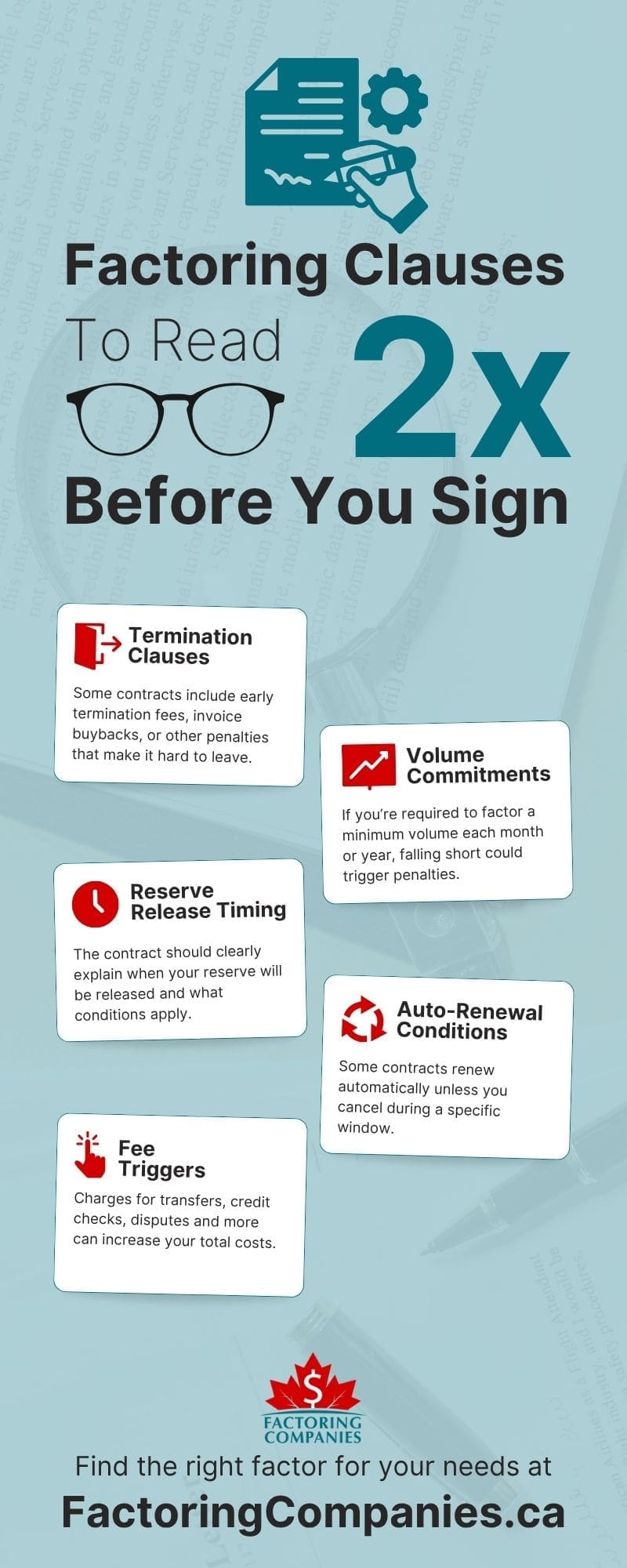
Trying to make sense of factoring contract clauses? Whether you’re reading through an agreement and deciding whether to sign or are exploring the idea of factoring to see if it might be right for you, the nature of the relationship you’re creating tends to come down to a few specific terms and conditions. We’ll walk you through them below.
Key Components of Factoring Contracts
Factoring contracts vary depending on the provider, but most include a set of standard terms. Understanding these upfront helps you avoid surprises and creates a clearer picture of how the relationship will work.
Common Terms and Conditions in Factoring Agreements
- Factoring Volume Commitment: Some contracts require you to factor a minimum amount each month or year. If you do not meet that threshold, penalties may apply.
- Advance Rate: This is the percentage of the invoice value you receive upfront. The rate typically falls between seventy and ninety-five percent.
- Reserve Account: The remaining funds are held back until your customer pays the invoice. After that, the reserve is released to you minus any fees. The contract should spell out when and how that happens.
- Payment Terms: Contracts define how long your customers have to pay. That timing affects when you get the reserve and whether any follow-up steps are triggered.
- Ownership of Receivables: Once you submit an invoice for funding, the factoring company becomes the legal owner of that receivable and handles collection.
- Dispute Handling: If a customer disputes an invoice, the contract should outline how it will be addressed and what your obligations are during the process.
- Term Length and Renewal: Many agreements renew automatically unless cancelled during a specific notice period. Missing that window could lock you in for another full term.
Obligations in Factoring Contracts for Both Parties Explained

- Your Responsibilities: You will be required to send accurate invoices, disclose any disputes, keep customer accounts current, and often notify your clients that a third party is handling collections.
- The Factor’s Responsibilities: The company must fund invoices according to the agreed timeline, release reserves when payments clear, and handle collections professionally. Some also provide access to an online portal where you can track payments and account activity.
Essential Factoring Clauses for Protecting Your Business
You’ll also want to keep an eye out for essential clauses in factoring agreements to protect your business by safeguarding your cash flow, limiting liability, and helping you avoid getting locked into a contract that no longer serves you.
Non-Recourse vs. Recourse Factoring Clauses
This is one of the most critical distinctions in factoring. It determines who takes the hit if your customer fails to pay.
- Recourse Factoring Clauses: With recourse factoring, your business agrees to repay the factor if your customer does not pay the invoice. That can happen due to insolvency, disputes, or missed payments beyond a certain number of days. This model usually comes with lower fees, but it also means you’re still on the hook for risk.
- Non-Recourse Factoring Clauses: In a non-recourse setup, the factoring company absorbs the loss if your customer fails to pay due to credit issues like bankruptcy. That said, “non-recourse” does not always mean risk-free. Many contracts still place responsibility on you if there is a billing dispute or if the invoice is inaccurate. Always read the fine print to see exactly what is and is not covered.
Termination and Exit Clauses
While some factoring companies allow you to end the agreement when it suits you, others have requirements that you stay for a specified period of time. Despite this, there are still usually ways to terminate the agreement, though fees and penalties may apply. Understanding early termination fees in factoring agreements will help you structure the agreement in a way that works for you and make exiting easier when the time comes.
- Early Termination Penalties in Factoring: Many contracts include penalties if you end the agreement before the full term. This can be a flat fee or a percentage of your expected volume. In some cases, you may also be required to buy back outstanding receivables.
- Notice Period Requirements: Some factoring companies require written notice 30 to 90 days in advance before you can exit. If you miss the window, your contract can sometimes auto-renew for another term.
- Buyout Clauses: If you plan to switch factoring providers or stop factoring altogether, you may be required to pay off the balance of any open invoices or cover the factor’s anticipated profit.
Factoring Payment Terms Explained

The phrase “net 30” may sound familiar, but in a factoring context, payment terms do more than outline when your customer needs to pay. They affect when you receive your full funds, what happens if a client delays, and how much risk you’re taking on without realizing it.
What Payment Terms Typically Include
- Invoice Due Date: The contract will specify how long your customer has to pay once an invoice is issued. Common options include net 30, net 60, or net 90 days.
- Reserve Release Timing: You’ll get the initial advance right away, but the remainder, also called the reserve, is held until your customer pays. The contract should explain exactly when that reserve is released and under what conditions.
- Maximum Payment Window: Some agreements include a “repurchase window.” If your customer does not pay within a certain period of time, such as 90 to 120 days, you may be required to buy back the invoice or replace it with another one of equal value.
- Default Triggers: If your client fails to pay within the allowed timeframe, or if you delay forwarding required documents, the contract may consider the invoice in default. That could reduce the amount you receive or affect your ability to factor future receivables.
Details That Impact Your Business
- Customer Grace Periods: Even if your invoice says net 30, your contract might allow the factor to wait longer before considering it overdue. That means waiting longer for your reserve and possibly accruing extra fees.
- Backdating or Delayed Submissions: Some factors date the start of the payment window from when they receive the invoice, not from when it was issued. If you submit late, you might unknowingly shorten your payment window and increase the risk of a chargeback.
- Holiday and Weekend Adjustments: Check whether the contract accounts for non-business days. If your client’s payment is due on a holiday, the due date might shift, and so could your reserve release.
Transparency in Factoring Fee Structures and Hidden Charges
The advance rate and discount fee usually get the most attention, but they are not the only costs involved. To get a true picture of what factoring will cost your business, you need to look beyond the headline rate and ensure you’re getting total factoring fee structure transparency.
Common Hidden Fees in Factoring Contracts and Their Impact
While fees aren’t generally “hidden” in the way some people suspect they are, factoring costs vary between companies, and the way fees are structured can differ.
- Invoice Processing Fees: Some factoring companies charge a flat fee per invoice, regardless of its size. These add up fast if you factor smaller invoices in high volume.
- Credit Check Fees: You may be charged when the factor runs credit checks on your customers. This can be a one-time charge or a recurring fee if the customer is reviewed more than once.
- ACH or Wire Transfer Fees: Expect a fee each time funds are transferred to your account. Wires tend to cost more than automated clearing house (ACH) payments.
- Late Payment Penalties: If your client pays late, you may be charged an additional fee, even in recourse agreements where you still bear the risk.
- Renewal or Annual Fees: Some contracts include a yearly administrative charge or an automatic renewal fee that kicks in if you do not provide proper notice of cancellation.
- Minimum Monthly Fees: If your contract includes a factoring volume commitment and you fall short, you might still be billed as if you had met the target.
- Invoice Dispute Fees: If a customer disputes a charge or refuses to pay, some factors charge extra to manage the dispute or collections effort.
Transparency in Fee Structures
Good providers distinguish themselves by providing you with clarity and ensuring you understand the terms you’re agreeing to.
- Fee Schedules: Reputable factoring companies include a full fee schedule as part of the contract, or as an appendix. If the contract refers to “standard fees” but does not define them, ask to see the breakdown before signing.
- Plain Language Explanations: If a term is unclear, ask for it to be rewritten. A solid factoring partner should be able to explain each charge in simple terms.
- All-In Cost Estimates: Before you commit, ask the factor to walk through a cost example using one of your real invoices. This can help you spot any fees that are not obvious at first glance.
Tips for Negotiating Better Terms in Factoring Contracts
The first offer you receive is rarely the only offer available. Most factors are open to negotiating factoring contract terms, especially if your business has strong financials, reliable customers, or a steady flow of receivables.
How to Negotiate Factoring Contract Terms for Your Business
Businesses that have success customizing factoring contracts usually find ways to make it a win for them and the factor. That means there’s usually some trade-off, where you request a shift in one area and make a concession in another.
Key Points to Discuss with Factoring Companies
While many, if not most, parts of an agreement can be negotiated, businesses tend to focus on the areas outlined below.
- Volume Commitments: If you are unsure how many invoices you will factor each month, ask for a flexible or tiered commitment. This reduces your risk of being penalized during slower months.
- Advance Rate: Companies often start with a conservative advance. If your customers have good credit and a solid payment history, you may be able to push for a higher upfront percentage.
- Fee Structures: Ask whether the factor uses flat-rate pricing or tiered fees based on how quickly customers pay. You may save money if your clients tend to pay within 30 days.
- Reserve Release Timing: Some contracts hold reserves for longer than necessary. You can often negotiate faster release terms, especially once the factor has seen consistent payment behaviour.
- Termination Clauses: If the early exit fees or auto-renewal terms feel too restrictive, ask for softer conditions. A factor that wants your business will often agree to lower penalties or shorter notice periods.
How to Customize Contracts to Fit Your Business Needs
If you’re more interested in testing factoring on a limited basis or ensuring you’re maximizing the value of the services you’re receiving, explore the following steps.
- Negotiate a Trial Period: Some factors allow a short-term trial before committing to a long-term agreement. This gives both sides a chance to evaluate the fit.
- Limit the Scope of the Agreement: You do not have to factor every customer or every invoice. Negotiate to exclude specific clients or low-value invoices if that helps your margins.
- Ask About Service Add-Ons: Some providers offer credit checks, invoice preparation, collections support, or online portals. If those services matter to you, ask whether they can be included at no extra cost.
- Clarify Definitions: Make sure terms like “default,” “dispute,” or “non-payment” are clearly defined in plain language. If anything feels vague, it is worth pushing back.
Walk Through a Factoring Contract with a Specialist
While this guide can help you understand factoring contract clauses in a general sense, a factoring specialist can walk you through the terms your business will actually be offered and can explore how to tailor the agreement for your needs. To talk with a specialist, request a complimentary quote.
FAQs on Understanding Factoring Contract Clauses and What to Focus On
Why is it important to review the clauses in a factoring agreement?
Reviewing contract clauses helps you understand what you are agreeing to, especially around fees, obligations, and timelines. Missing a single clause can lead to surprise penalties or restrictions. A careful review ensures the contract supports your goals and protects your business from unnecessary risk.
How can I evaluate factoring contract clauses before signing?
Start by identifying any vague or complex language, especially in areas involving fees or contract length. Compare the terms to offers from other providers. Ask direct questions and request clarification in plain language. If needed, involve a legal advisor who understands commercial finance agreements.
Are factoring contract clauses negotiable?
Yes, many factoring contract clauses can be negotiated, including contract length, volume commitments, and fee structures. Factors are often willing to adjust terms for businesses with strong financials or consistent receivables. You do not have to accept the first version you are offered.
How detailed should factoring contract clauses be?
Clauses should be detailed enough to outline expectations clearly without using excessive legal jargon. Look for specifics around timelines, fees, and responsibilities. Vague or overly broad clauses can leave room for interpretation, which may not work in your favour if disputes arise later.
What should I ask about the clauses in a factoring contract?
Ask what each clause means in practical terms for your business. Clarify how fees are triggered, how renewals work, and what happens if your customer pays late. Ask whether the terms are fixed or flexible and request real-world examples to help you evaluate the impact.
Can factoring contract clauses be customized to fit my business?
Yes, many factoring companies are open to custom clauses. You may be able to modify terms to match your cash flow cycle, customer base, or seasonal volume. Customization helps ensure the contract reflects how your business actually operates, rather than forcing you into a rigid structure.
How do I know if factoring contract clauses are fair?
Compare offers from multiple providers and review how transparent and flexible the clauses are. Fair clauses are clearly worded, define both parties’ obligations, and do not include unexpected penalties. If something feels one-sided or unclear, it’s worth asking for changes or walking away.

About Factoring Companies Canada
Related Insights
Get an instant factoring estimate
Factoring results estimation is based on the total dollar value of your invoices.
The actual rates may differ.
CLAIM YOUR FREE FACTORING QUOTE TODAY!
PREFER TO TALK?
You can reach us at
1-866-477-1778
Get an instant factoring estimate
Factoring results estimation is based on the total dollar value of your invoices.
The actual rates may differ.
CLAIM YOUR FREE FACTORING QUOTE TODAY!
PREFER TO TALK? You can reach us at 1-866-477-1778











